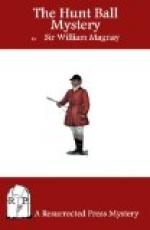CHAPTER XVII
WHAT A GIRL SAW
With Morriston’s departure a rather uncomfortable silence fell upon the party left in the room. Every one seemed to feel that there was something in the air, the shadow of a possibly serious development in the case. Even Kelson, who was otherwise inclined to be jubilant over the freeing of his fiancee from suspicion, seemed to feel it was no time or place just then for gaiety, and his expression grew as grave as that of the rest.
“I wonder what these fellows have come to say,” he observed as he paced the room.
“Let’s hope to announce that at last they are going to leave you in peace, Edith,” Miss Tredworth said.
Edith Morriston did not alter her position as she stood looking out of the window. “Thank you for your kind wish, Muriel,” she responded in a cold voice; “but I’m afraid that is too much to hope for just yet.”
“Yet one doesn’t see what else it can be,” Kelson observed reflectively. “They can hardly have found out exactly how the man came by his death; much more likely to have abandoned their latest theory, eh, Hugh?”
Gifford was looking, held by the grip of his imagination, at the tall figure by the window; wondering what was passing behind that veil of impassiveness. “I don’t see what they can have found out away from this house,” he said, rousing himself by an effort to answer; “and they don’t seem to have been here lately.”
“Well, we shall see,” Kelson said casually. “Ah, here comes Dick back again.”
Morriston hurried in with a serious face. In answer to Kelson’s, “Well, Dick?” he said.
“It appears a rather extraordinary piece of evidence has just come to light; one which, if true, completely solves the mystery of the locked door. I asked Freeman if there was any objection to you fellows coming to the library and hearing the story; he is quite agreeable. So will you come? You too, Edith, and Miss Tredworth; there is nothing at all horrible in it so far.”
For the first time Edith Morriston turned from the window. “Is it necessary, Dick?” she protested quietly. “I’d just as soon hear it all afterwards from you. These police visitations are rather getting on my nerves.”
“Very well, dear; you shall hear all about it later on,” her brother responded, and led the way down to the library. Gifford was the last to leave the room, and his glance back showed him that Edith Morriston had turned again to the window and resumed her former attitude.
In the library were the chief constable, Gervase Henshaw and a local detective.
“Now, Major Freeman,” Morriston said as he closed the door, “we shall be glad to hear this new piece of evidence.”
Major Freeman bowed. “Shortly, it comes to this,” he began. “A young woman named Martha Haynes, belonging to Branchester, called at my office this morning and made a statement which, if reliable, must have an important bearing on this mysterious case.




